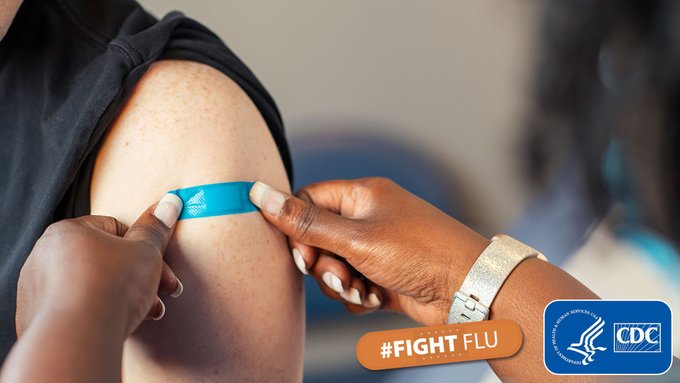
Related Topics
Early fall is the best time for older adults to get their flu vaccines to protect against the influenza virus, also known as the “flu.”
This year, the Centers for Disease Control and Prevention (CDC) also recommends that adults 60 and older get the newly updated COVID vaccine and talk to their doctor about the respiratory syncytial respiratory syncytial virus (RSV) vaccine.
Both the latest flu vaccine and the RSV vaccine are available now. And so is an updated COVID vaccine approved by federal health officials in mid-September.1 Enter your ZIP code at vaccines.gov to find places near you offering flu and updated COVID vaccines.
If you have questions about which vaccines are best for you or when to get them—or how long to wait after a previous booster or COVID infection before getting the most recently approved vaccine—talk to your doctor.
The importance of flu shots for older adults
The single best way to reduce your risk from flu and possibly serious complications is to get the flu shot every year. Here are some flu facts to help explain why getting your vaccine is so important.
What is influenza or flu?
Are influenza (flu) and COVID-19 caused by the same virus? The answer is no. Influenza is a highly contagious respiratory infection caused by the influenza virus. The flu virus is different from the coronavirus, and two different vaccines are required for protection. Individuals who have had the COVID-19 vaccine or are planning to be vaccinated against COVID-19 can safely get the flu shot this year and every year.
Although they are caused by different viruses, there are some similarities between COVID-19 and flu.
Just like COVID-19, flu is easily passed from person to person when someone coughs, talks, or sneezes.
You can also catch the flu virus from recently contaminated surfaces or objects that have the virus on them and then touch your mouth, eyes, or nose.
What are the symptoms of flu?
Some symptoms of flu are similar to the common cold, like sneezing, cough, sore throat, and chest discomfort. However, flu usually starts more quickly and symptoms are much more severe than the common cold. Flu symptoms also include fever, body aches, chills, headaches, and feeling tired.
People often ask, “Can you get the flu from the flu shot?” No, you cannot. The flu shot is made from inactive (dead) virus that can't cause influenza infection. However, you may get brief, mild side effects from the flu vaccine that can feel almost flu-like.
Why are older adults at higher risk for flu?
While each flu season differs in severity, during most seasons, people 65 years and older bear the greatest burden of disease. The Centers for Disease Control and Prevention estimates that between 70-85% of seasonal flu-related deaths and between 50-70% of seasonal flu-related hospitalizations occurred in older adults.2 People 65+ are at higher risk of developing serious complications from flu compared with younger adults. This increased risk is due in part to declines in immune response with age.
Older adults with chronic conditions, like heart disease, diabetes, and lung disease, such as asthma or COPD, are at highest risk for developing life-threatening complications from the flu.
Because of age-related changes in their immune systems, people 65 years and older may not respond as well to vaccination as younger people. Although immune responses may be lower in older people, studies have found that flu vaccine has been effective in reducing the risk of doctor visits and hospitalizations due to the flu. In addition, high dose vaccines and an adjuvanted flu vaccine are available; adjuvanted flu vaccine includes an additive that provide a higher immune response. These vaccines have been shown to more effective in older adults in producing a stronger immune response and reducing illness compared to the standard flu vaccine shot. Your doctor or pharmacist will recommend which flu vaccine is best for you.
Why are flu shots needed every year?
If you’re concerned about how to prevent catching the flu from someone, getting a flu vaccine is your best bet. CDC recommends that almost everyone 6 months and older get a seasonal flu vaccine every year, ideally by the end of October. However, as long as flu viruses are circulating, vaccination should continue throughout flu season, even into January or later.
Flu vaccines are updated each season to keep up with changing viruses. Also, immunity against the flu virus decreases over a year so annual vaccination is needed to make sure everyone has the best possible protection against flu. Because immunity may decrease more quickly in older people, it is especially important that older adults are not vaccinated too early like in July or August.
Federal health officials recommend specific flu vaccines for people age 65 and older. These vaccines are Fluzone High-Dose Quadrivalent, Flublock Quadrivalent, and Fluad Quadrivalent. Studies have shown they trigger a better immune response in older adults than the traditional flu vaccine.3,4 If you are 65 or older, ask for one of these vaccines when you are getting your flu shot from your doctor, pharmacists, or a vaccine clinic. But if one of these vaccines is not available or will not be available soon, a traditional flu shot is recommended.
What about the pneumococcal vaccine?
Pneumonia is an example of a serious flu-related complication that can cause death. People who are 65 years and older also should be up to date with pneumococcal vaccine to protect against pneumococcal disease, such as pneumonia, meningitis, and bloodstream infections. Talk to your doctor to find out which pneumococcal vaccine is recommended for you. If you are not up to date on your pneumococcal vaccine, you can get that vaccine when you get a flu vaccine.
Does Medicare cover vaccines?
Medicare Part B covers both the flu shot and pneumococcal vaccines with no out-of-pocket costs to Medicare beneficiaries.
Schedule your fall flu shot
According to the CDC, the best months for most people to get vaccinated against the flu are September and October. It's important to note that it takes about two weeks after the flu shot to develop antibodies or protection against the flu virus.
Getting your annual flu shot can help you stay active, healthy, and independent. Ask your health care provider which flu vaccine is right for you. You can search by ZIP code to find flu vaccines near you at vaccines.gov.
Sources
1. Centers for Disease Control and Prevention. Stay Up to Date wtih COVID-19 Vaccines. Found on the internet at https://www.cdc.gov/coronavirus/2019-ncov/vaccines/stay-up-to-date.html
2. Centers for Disease Control and Prevention. Flu & People 65 Years and Older. Found on the internet at https://www.cdc.gov/flu/highrisk/65over.htm
3. Centers for Disease Control and Prevention. Fluzone High-Dose Seasonal Influenza Vaccine. Found on the internet at https://www.cdc.gov/flu/prevent/qa_fluzone.htm
4. Centers for Disease Control and Prevention. CDC Director Adopts Preference for Specific Flu Vaccines for Seniors. Found on the internet at https://www.cdc.gov/media/releases/2022/s0630-seniors-flu.html




